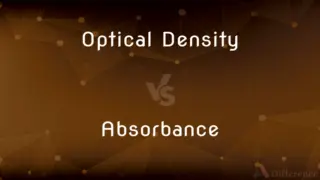Pronoun vs. Nominal — What's the Difference?
By Fiza Rafique & Urooj Arif — Updated on April 4, 2024
Pronouns are words that substitute for nouns or noun phrases, like "he" or "they," simplifying language. Nominals refer to nouns and noun phrases collectively, encompassing a broader category including pronouns.

Difference Between Pronoun and Nominal
Table of Contents
ADVERTISEMENT
Key Differences
Pronouns serve as a linguistic tool to avoid repetition and aid in making sentences more efficient and less cumbersome. They can represent a person, place, thing, or idea without having to name them directly, for example, "she," "it," or "who." Nominals, on the other hand, include all forms of nouns and noun phrases, providing the backbone for constructing sentences. They represent people, places, concepts, or objects in a more direct manner than pronouns.
While pronouns are specific types of words used in place of nouns and noun phrases, nominals are a broader category that includes nouns in any form, whether singular, plural, proper, common, abstract, or concrete. This means all pronouns can be considered part of the nominal group, but not all nominals are pronouns. Nominals can be subjects, objects, or complements in sentences, whereas pronouns primarily function to replace these nominals for coherence and conciseness in discourse.
The use of pronouns is crucial for maintaining continuity in conversation and writing, allowing speakers and writers to refer back to previously mentioned nouns without repetition. Nominals, encompassing a wider range of linguistic elements, are essential for introducing new concepts, entities, and ideas into the discourse.
Pronouns are categorized based on their function in a sentence—such as personal, possessive, demonstrative, and relative pronouns—each serving a different grammatical purpose. Nominals, while including these pronouns, also embrace the entire spectrum of nouns, offering a vast array of descriptive and concrete references to the world.
Comparison Chart
Definition
Words that substitute for nouns or noun phrases.
Nouns and noun phrases collectively, including pronouns.
ADVERTISEMENT
Examples
"he," "they," "which"
"John," "the fast car," "happiness," "they"
Function
Avoid repetition, replace nouns/noun phrases.
Represent people, places, concepts, objects directly.
Categories
Personal, possessive, demonstrative, relative, etc.
Singular, plural, proper, common, abstract, concrete, including all pronoun types.
Role in Sentences
Serve as placeholders for specific nominals mentioned earlier.
Act as subjects, objects, complements, and can introduce new information.
Compare with Definitions
Pronoun
Represents unspecified entities or people.
Someone left their bag.
Nominal
Includes abstract concepts or qualities.
Freedom is essential.
Pronoun
Indicates possession without naming the possessor.
This book is mine.
Nominal
Functions as the subject, object, or complement in sentences.
Happiness is the key to success.
Pronoun
Refers back to something previously mentioned.
The car is broken; it won't start.
Nominal
Encompasses all forms of nouns and noun phrases.
The quick brown fox jumps over the lazy dog.
Pronoun
Substitutes for nouns or noun phrases.
When Sarah arrived, she was tired.
Nominal
Can specify a particular person, place, or thing.
London is a vibrant city.
Pronoun
Avoids repetition in text and speech.
Daniel likes coffee. He drinks it daily.
Nominal
Represents collective entities.
The team celebrated their victory.
Pronoun
In linguistics and grammar, a pronoun (abbreviated PRO) is a word that substitutes for a noun or noun phrase. Pronouns have traditionally been regarded as one of the parts of speech, but some modern theorists would not consider them to form a single class, in view of the variety of functions they perform cross-linguistically.
Nominal
(of a role or status) existing in name only
Thailand retained nominal independence under Japanese military occupation
Pronoun
A word that can function as a noun phrase used by itself and that refers either to the participants in the discourse (e.g. I, you) or to someone or something mentioned elsewhere in the discourse (e.g. she, it, this).
Nominal
(of a price or charge) very small; far below the real value or cost
They charge a nominal fee for the service
Pronoun
The part of speech that substitutes for nouns or noun phrases and designates persons or things asked for, previously specified, or understood from the context.
Nominal
(of a quantity or dimension) stated or expressed but not necessarily corresponding exactly to the real value
EU legislation allowed variation around the nominal weight (that printed on each packet)
Pronoun
Any of the words within this part of speech, such as he or whom.
Nominal
Relating to or functioning as a noun
A nominal group
Pronoun
(grammar) A type of word that refers anaphorically to a noun or noun phrase, but which cannot ordinarily be preceded by a determiner and rarely takes an attributive adjective.
Nominal
(chiefly in the context of space travel) functioning normally or acceptably.
Pronoun
Any of the pronouns by which a person prefers to be described, typically reflecting gender identity.
My pronouns are she/her.
Nominal
Of, resembling, relating to, or consisting of a name or names.
Pronoun
A word used instead of a noun or name, to avoid the repetition of it. The personal pronouns in English are I, thou or you, he, she, it, we, ye, and they.
Nominal
Assigned to or bearing a person's name
Nominal shares.
Pronoun
A function word that is used in place of a noun or noun phrase
Nominal
Existing in name only; not real
“a person with a nominal religious position but no actual duties” (Leo Damrosch).
Nominal
Insignificantly small; trifling
A nominal sum.
Nominal
(Philosophy) Of or relating to nominalism.
Nominal
(Economics) Of or relating to an amount or rate that is not adjusted for inflation.
Nominal
(Business) Of or relating to the par value of a security rather than the market value.
Nominal
(Grammar) Of or relating to a noun or word group that functions as a noun.
Nominal
Aerospace & Engineering According to plan or design
“The flyby was declared a success after the spacecraft phoned home to Earth at 8:53 p.m. EDT and all systems were nominal” (Emilee Speck).
Nominal
A word or group of words functioning as a noun.
Nominal
Of, resembling, relating to, or consisting of a name or names.
Nominal
Assigned to or bearing a person's name.
Nominal
Existing in name only.
A nominal difference
Nominal
(philosophy) Of or relating to nominalism.
Nominal
Insignificantly small.
He gave me only a nominal sum for my services.
Nominal
Of or relating to the presumed or approximate value, rather than the actual value.
The nominal voltage is 1.5 V, but the actual figure is usually higher.
The nominal yield of a nuclear weapon
Nominal
(finance) Of, relating to, or being the amount or face value of a sum of money or a stock certificate, for example, and not the purchasing power or market value.
Nominal
(finance) Of, relating to, or being the rate of interest or return without adjustment for compounding or inflation.
Nominal
(grammar) Of or relating to a noun or word group that functions as a noun.
This sentence contains a nominal phrase.
Nominal
(engineering) According to plan or design.
We'll just do a nominal flight check.
Apart from the slightly high temperature, all the readings from the spacecraft are nominal.
Nominal
(economics) Without adjustment to remove the effects of inflation.
My employer does not understand how low my nominal wage is.
The nominal GNP of this country is pretty low.
Nominal
Having values whose order is insignificant.
Nominal
(taxonomy) Of a species, the species name without consideration of whether it is a junior synonym or in reality consists of more than one biological species.
Nominal
(grammar) A noun or word group that functions as part of a noun phrase.
This sentence contains two nominals.
Nominal
(grammar) A part of speech that shares features with nouns and adjectives. (Depending on the language, it may comprise nouns, adjectives, possibly numerals, pronouns, and participles.)
Nominal
A number (usually natural) used like a name; a numeric code or identifier. (See nominal number on Wikipedia.)
Numeric codes of characters used in programming are nominals.
Nominal
A person listed in the Police National Computer database as having been convicted, cautioned or recently arrested.
Nominal
Of or pertaining to a name or names; having to do with the literal meaning of a word; verbal; as, a nominal definition.
Nominal
Existing in name only; not real; as, a nominal difference.
Nominal
Within acceptable limits; as expected; as, the hydraulic lines are at nominal pressure; - used mostly in aviation and space operations.
Nominal
Insignificant; trifling; - of prices or costs, as compared with the benefits gained; as, to pay a nominal sum for the data; a nominal fee.
Nominal
A nominalist.
Nominal
A verb formed from a noun.
Nominal
A name; an appellation.
A is the nominal of the sixth note in the natural diatonic scale.
Nominal
Relating to or constituting or bearing or giving a name;
The Russian system of nominal brevity
A nominal lists of priests
Taxable males as revealed by the nominal rolls
Nominal
Insignificantly small; a matter of form only (`tokenish' is informal);
The fee was nominal
A token gesture of resistance
A tokenish gesture
Nominal
Pertaining to a noun or to a word group that functions as a noun;
Nominal phrase
Noun phrase
Nominal
Being value in terms of specification on currency or stock certificates rather than purchasing power;
Nominal or face value
Nominal
Named; bearing the name of a specific person;
Nominative shares of stock
Nominal
Being such in name only;
The nominal (or titular) head of his party
Common Curiosities
Why are pronouns important in language?
Pronouns improve the flow of conversation and writing by eliminating the need for repetitive use of specific nouns, making language more efficient and cohesive.
What does nominal mean?
Nominal refers to nouns and noun phrases as a collective category, including a wide range of entities, qualities, and concepts.
Do pronouns always refer to people?
No, pronouns can refer to people, places, things, or ideas.
What is a pronoun?
A pronoun is a word used in place of a noun or noun phrase to avoid repetition and simplify sentences.
Can you give an example of a pronoun and a nominal in the same sentence?
"Sarah saw a cat and she petted it." ("she" and "it" are pronouns; "Sarah" and "a cat" are nominals.)
What is the difference between a nominal and a proper noun?
A proper noun is a specific type of nominal that names particular individuals, places, or entities, and is always capitalized.
How are pronouns and nominals related?
Pronouns are a subset of nominals, specifically serving to replace nouns and noun phrases in discourse.
Can a nominal function as the object of a sentence?
Yes, nominals can serve as subjects, objects, or complements within sentences.
How do nominals contribute to sentence structure?
Nominals are fundamental to constructing sentences, providing the necessary subjects, objects, and complements to convey meaning.
Are all nouns nominals?
Yes, all nouns, regardless of their type or form, fall under the category of nominals.
Can pronouns and nominals be used interchangeably?
Pronouns can replace nominals to avoid repetition, but specific nominals are needed to introduce new entities or concepts into discourse.
Share Your Discovery

Previous Comparison
Grocery vs. Groceries
Next Comparison
Violin vs. GuitarAuthor Spotlight
Written by
Fiza RafiqueFiza Rafique is a skilled content writer at AskDifference.com, where she meticulously refines and enhances written pieces. Drawing from her vast editorial expertise, Fiza ensures clarity, accuracy, and precision in every article. Passionate about language, she continually seeks to elevate the quality of content for readers worldwide.
Co-written by
Urooj ArifUrooj is a skilled content writer at Ask Difference, known for her exceptional ability to simplify complex topics into engaging and informative content. With a passion for research and a flair for clear, concise writing, she consistently delivers articles that resonate with our diverse audience.















































